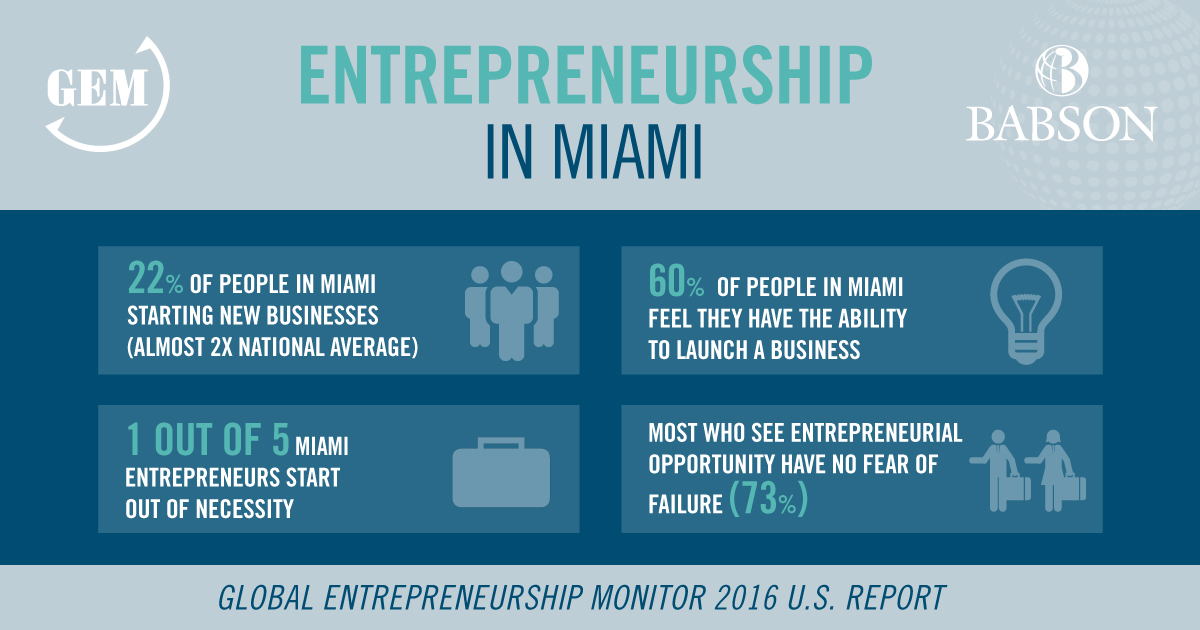Entrepreneurship and its Potential in Miami
Guest post by Babson College Professor Donna Kelley, co-author of the 2016 Global Entrepreneurship Monitor (GEM) U.S. Report
Miami is booming with startups.
According to the most recent United States Global Entrepreneurship Monitor (GEM) survey—22 percent of working age adults in Miami are starting or running new businesses, compared to the national average of 12.6 percent.
The future looks even more promising for this city, with nearly two-thirds of adults thinking there are good opportunities around them for starting a business, and nearly one-fourth planning to start a business in the next three years.
Babson has witnessed such potential, not only through its network of more than 1,300 Babson alumni living, working, and thriving in the Miami region, but also through its entrepreneurial initiatives in the city. These initiatives include the Women Innovating Now (WIN) Lab® Miami which expanded to the area in 2016, and the Goldman Sachs 10,000 Small Businesses program, of which Babson is the academic architect helping to empower Miami’s small business owners to grow their businesses.
Growth is key for Miami entrepreneurs and the future of the city’s economy as a whole. Although Miami was this year ranked No. 1 in the nation for startup activity by the Kauffman Foundation, a recent Miami Herald article cites yet another Kauffman study which uses census data and ranks Miami “near the bottom of the pack for entrepreneurial growth.”
While this may be true today, GEM finds that Miami’s entrepreneurs are, in fact, motivated to create jobs: 44 percent intend to hire six or more employees over the next five years. Such intent and wealth potential will be extremely important given the fact that unemployment in the city is slightly higher than the national average (5.4 percent vs. 4.9 percent), and annual household incomes are low ($31, 051 vs. $57, 617).
For many in Miami, entrepreneurship provides an alternative form of employment when there are few good work choices: 19 percent of entrepreneurs in Miami are starting out of necessity versus opportunity. Nationally, an average of only 11 percent of entrepreneurs start out of necessity. However, with Miami’s high entrepreneurship rates, we can expect these entrepreneurs to contribute toward positive trends in employment and income levels in the future.
Supporting women entrepreneurs will be key to this transformation. In Miami, there are fewer than six women starting a business for every 10 men. This compares with a national average of just over seven women for every 10 men entrepreneurs.
And although the entrepreneurship rate among people ages 18-34 is higher than the national average (19 percent vs. 14 percent), it is the mid-career group that contributes the most to Miami’s high overall rates. It is clear that entrepreneurs with experience, networks, and access to resources can leverage these advantages in their businesses. Younger people, though, may have unique ideas that appeal to different market segments, and they too should be supported.
Additionally, Miami needs more innovative entrepreneurs. The United States has a high innovation rate, with 37 percent of entrepreneurs stating they are introducing products or services that are new to customers and not typically offered by competitors. Only 24 percent are innovative in Miami.
Promoting innovation would increase the impact of entrepreneurship in an already entrepreneurial city, and supporting the energy and ideas of youth and women would extend these opportunities to those less well-served in the entrepreneurship ranks.
With all of this in mind, Babson is eager to not only continue the growing success and impact of its existing programs in the region, but also to launch its much anticipated Miami graduate programs in Fall 2018.
With such an abundance of entrepreneurial thinkers and doers, and a demonstrated need for growth opportunities, innovation, and support, Miami is the perfect city to bring Babson’s renowned entrepreneurship education.

